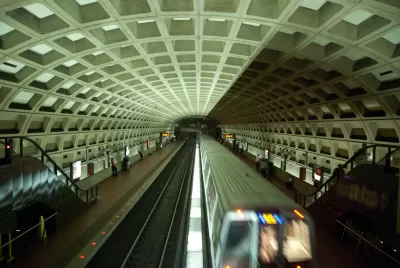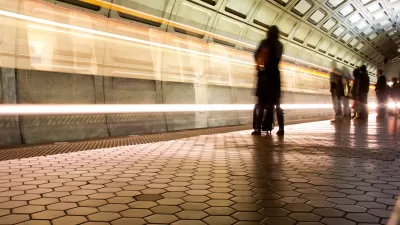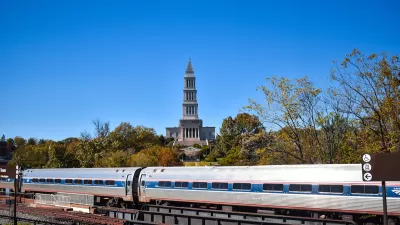The capital’s public transit system, the country’s third-largest, has been plagued by a series of problems ranging from a looming fiscal deficit to train crashes and track fires.

An article by Jake Blumgart in Governing outlines the Washington Mentropolitan Area Transit Authority’s (WMATA) fiscal crisis, the worst in its recent history. “Washington, D.C.’s mass transit offerings could get substantially worse next summer if something doesn’t radically change. WMATA’s most recent public forecast shows a $356 million deficit in the fiscal year 2024 budget, because only 53 percent of the trips taken pre-pandemic have returned.”
The system has also faced a series of crises. “In October, one of Metro’s newest 7000 series trains derailed in Arlington, Va.” Earlier this year, “Metro admitted that half its rail operators have not kept up on their driver certifications. Many were pulled from duty, resulting in further delays. A separate and unrelated report found that the agency’s personnel recklessly disregard worker safety.”
With a new general manager on the way, Metro has an opportunity for another reset. But in interviews and at hearings, outside stakeholders say they do not hear current board members and high-level staffers providing adequate strategies for WMATA’s existential challenges. The gamble seems to be that the system is too big to fail.
Blumgart details the agency’s history of questionable authority and accountability, its confusing and diffuse leadership structure, and the disturbing claim that the agency operates under a culture of noncompliance. The article also describes several options for governance structures that could place more accountability on the agency and find problems before they become full-blown crises. Blumgart doesn’t predict which outcome is most likely to be effective, but asks, “Why not put all options on the table at this moment of extreme uncertainty, and show policymakers from Congress to the legislature and city hall to the C-suites that change can come to Metro?”
FULL STORY: Washington Metro Is a Transit System in Deep Trouble

Alabama: Trump Terminates Settlements for Black Communities Harmed By Raw Sewage
Trump deemed the landmark civil rights agreement “illegal DEI and environmental justice policy.”

Planetizen Federal Action Tracker
A weekly monitor of how Trump’s orders and actions are impacting planners and planning in America.

The 120 Year Old Tiny Home Villages That Sheltered San Francisco’s Earthquake Refugees
More than a century ago, San Francisco mobilized to house thousands of residents displaced by the 1906 earthquake. Could their strategy offer a model for the present?

Opinion: California’s SB 79 Would Improve Housing Affordability and Transit Access
A proposed bill would legalize transit-oriented development statewide.

Record Temperatures Prompt Push for Environmental Justice Bills
Nevada legislators are proposing laws that would mandate heat mitigation measures to protect residents from the impacts of extreme heat.

Downtown Pittsburgh Set to Gain 1,300 New Housing Units
Pittsburgh’s office buildings, many of which date back to the early 20th century, are prime candidates for conversion to housing.
Urban Design for Planners 1: Software Tools
This six-course series explores essential urban design concepts using open source software and equips planners with the tools they need to participate fully in the urban design process.
Planning for Universal Design
Learn the tools for implementing Universal Design in planning regulations.
Clanton & Associates, Inc.
Jessamine County Fiscal Court
Institute for Housing and Urban Development Studies (IHS)
City of Grandview
Harvard GSD Executive Education
Toledo-Lucas County Plan Commissions
Salt Lake City
NYU Wagner Graduate School of Public Service





























